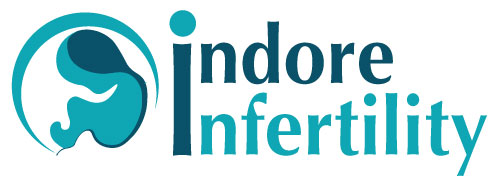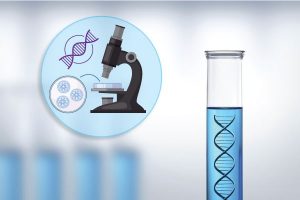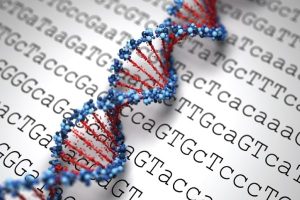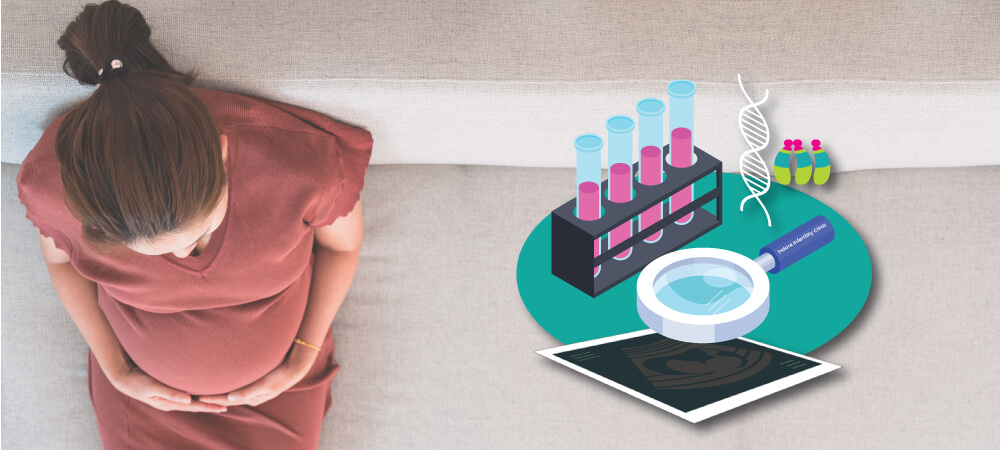
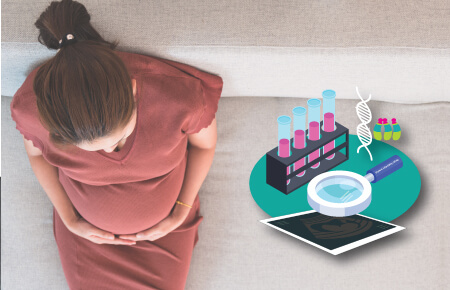
Down’s Syndrome is a chromosomal disorder. You need to understand the basics of chromosomes and genes before understanding the types of test and interpretation of the test result.
For basic understanding of the DNA, genes and chromosomes, helpful for further reading, please visit our blog.
All humans have their physical features encoded in form of genes right from the time of conception. It is our genes which decide how we will appear and how every function takes place in our body. These genes are stored in all the cells of our body in form of chromosomes.
Our blog aims to provide insights into every details about down’s syndrome, testing methodologies of Down’s Syndrome, their accuracy and available counseling in Indore.
What is Down’s syndrome?
All humans have 23 pairs of chromosomes, in total 46 chromosomes. Chromosomes are numbered from 1 to 23 and each cell has two pairs of each type of chromosome. However due to some abnormalities, at times there is presence of more or less number of chromosomes than expected in each cell, these errors are called numerical chromosomal errors. When a person has one extra chromosome number 21 i.e. instead of having 2 chromosome 21, they have 3 chromosome 21 in their cells, then such a person is said to have Down’s Syndrome or Trisomy 21.
Down’s syndrome is condition of abnormal chromosomal count (also called aneuploidy) in which the person has multiple physical abnormalities and functional problems in the body. The incidence of this condition increases with the age of the mother, and some other high-risk factors. But the overall incidence is around 1 in 700 live births. Which means that out of every 700 babies born, 1 may be affected by Down’s syndrome.
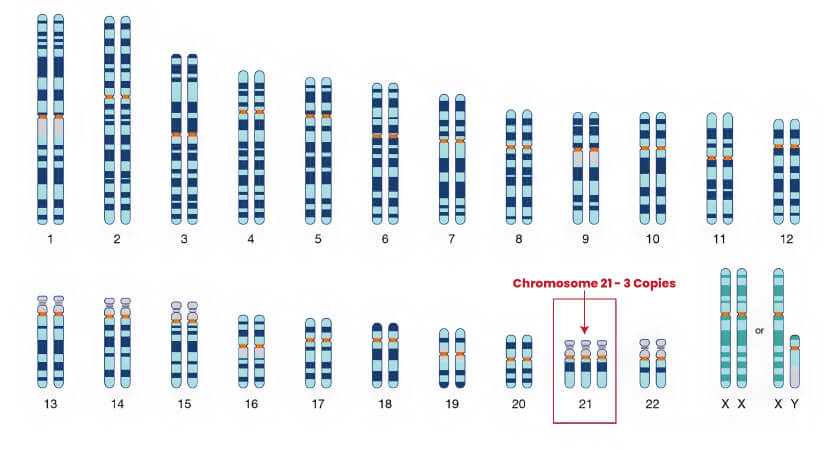
Is Down’s Syndrome same as Trisomy 21?
Yes, Down’s syndrome is also called Trisomy 21 because at the number 21 out of the 23 pairs of normally occurring chromosomes one extra chromosome is present making it total 3 chromosomes of chromosome number 21.
What are the symptoms of Down’s Syndrome ?
It presents as many abnormal features in appearance and body organs, leading to a spectrum of symptoms in the child. associated with delays in the child’s mental and physical development, as well as an increased risk for health problems. Some common features of Down syndrome are:
- A flat face
- Flat nose
- Protruding tongue
- Eyes slanting upwards at the outer corner
- Small ears
- Short neck
- Small hands and feet
- Single crease on palms
- Lax muscles
- Loose joints
- Short height
- Hearing loss
- Congenital heart defects (heart defects that are present at birth)
- Obesity
Physical features and medical problems linked to Down’s syndrome can vary widely from person to person.
What are the cause of Down’s Syndrome?
Down’s syndrome is caused by abnormal number of chromosomes in cells and there is no known reason of any factors that may cause this abnormal number of chromosomes, however it is a well known fact that the following factors increases the risk of Down’s syndrome in a baby:
- Maternal age more than 35 years; the risk increases further as the mothers age increases.
- If one of the parents has Down syndrome.
- If one of the parents has a balanced translocation in their chromosome (a chromosomal change which does not cause any effect in the parent, but can be transmitted to the baby and cause Down syndrome).
- If parents have a previous baby with Down syndrome.
Can Advance Maternal age cause Down’s syndrome?
Yes, advanced maternal age, (i.e. females older than 35 years age) is one of the risk factors of having a Down syndrome baby. As we age the probability of having some genetic and chromosomal diseases in the offspring increases including Down’s syndrome.
What are the signs or symptoms of Down’s syndrome during pregnancy?
There are no specific signs and symptoms that a mother has if she is carrying a Down syndrome baby. That is why it is important to offer screening tests to all pregnant women to test for Down’s syndrome during the first trimester.
Is Down’s syndrome a genetic disease?
No, as explained above, Down syndrome is a chromosomal disorder, more specifically called an aneuploidy (condition in which the chromosomal count is changed from expected 46).
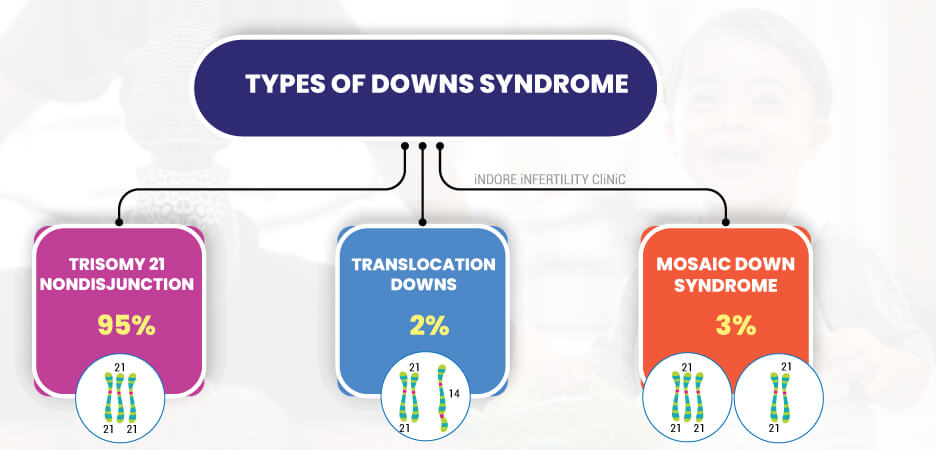
How many types of Down’s syndrome are there?
Trisomy 21:
In this case, each cell of the body has an extra 21st chromosome, so instead of having two 21st chromosome, each cell has 3 21st Approximately 95% of Down’s syndrome cases are Trisomy 21.
Translocation Down syndrome :
In this case there are three 21st chromosomes, but one of the chromosome is attached to some other chromosome instead of being separate. In translocation Down syndrome, the extra 21st chromosome may be attached to the either chromosome 14 or to other chromosome numbers like 13, 15, or 22. This makes up 3% of total Down’s syndrome affected people.
Mosaic Down syndrome :
In this type of Downs, some cells of the body have the extra 21st chromosome i.e. Trisomy 21 while some cells have normal number of chromosomes. Hence cells are a mix of normal and trisomy 21. This accounts for around 2% of Down affected people.
The severity of symptoms varies in different types of Down syndrome. Mosaic and Translocation Down’s syndrome are the milder form of Down’s syndrome.
Should Down’s syndrome baby be aborted?
Down syndrome is a disease of variable presentation, ranging from mild effects to severe abnormality. It is important for parents to be made aware of all possible problems and health issues their down’s baby may face. The decision to abort eventually lies with the parents.
A very important part of dealing with parents who are faced with such a tough decision is to provide them genetic counselling.
Facing the decision of a potential Down’s syndrome diagnosis is challenging. Our clinic provides expert genetic counseling services with experienced counselors specializing in such disorders. We ensure parents are well-informed about the options, offering support and guidance through the decision-making process.
It is important that a screening and if needed a confirmatory diagnostic test is performed as early as possible during pregnancy because the decision to terminate becomes more difficult with very advanced pregnancy. Decision to terminate the baby at an advance pregnancy of nearly 20 weeks also puts the mother at an increased risk.
It is also to understand that those affected by a milder form of Down syndrome (translocation and mosaic form), might not be severely affected and sometimes go on to have a normal life also, like the famous actor Ross James Kemp. He is known to be affected by translocation Down syndrome and is a revered actor, author and television presenter. It is important for parents to understand the possible severity of Down syndrome, if at all they are faced with the decision to terminate the pregnancy.
Can Down’s syndrome be caused during pregnancy by any medication or food ?
No, the medications and drugs taken while pregnant have not been linked to having a Down syndrome baby.
What is mosaic Down syndrome? How is it different from normal Down syndrome?
Mosaic Down syndrome is a condition in which only some cells are affected in the body and bear the extra chromosome number 21, while other cells are not affected and bear normal number of chromosomes. It is called mosaic because in a way it is a mix of affected and unaffected cells in the body.
What is Translocation Down’s syndrome?
In this type of Down syndrome, the extra chromosome 21 is attached to any other chromosome. Either a complete chromosome or just a part of extra chromosome is attached. This makes up 3% of total affected people. It is a milder form of Down syndrome. The famous actor, author are television presenter Ross James Kemp is known to be affected by translocation Down syndrome.
How can I know if baby has Down’s syndrome during pregnancy?
Various tests can be performed during early pregnancy to know if the baby has Down syndrome. Read the next question related to types of testing for Down’s syndrome to understand about them in details.
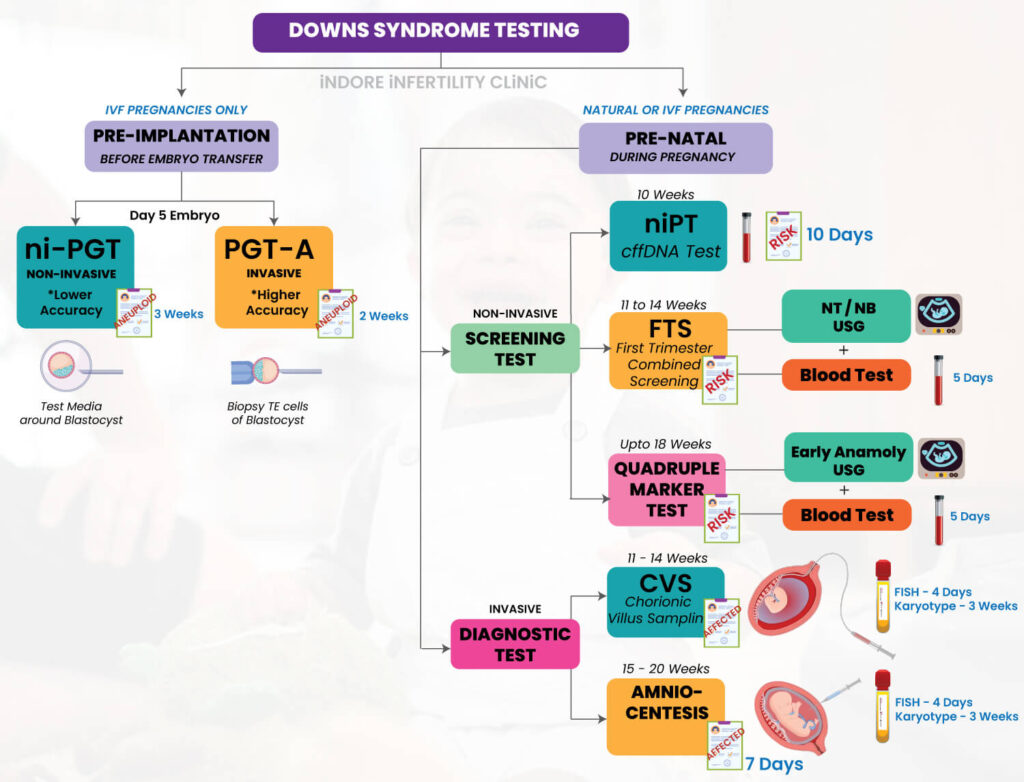
What are the Screening tests for Down Syndrome ?
- Screening tests are some tests done during pregnancy which can indicate the likelihood or chances that a mother is carrying a baby with Down syndrome. But these tests can’t tell for sure or diagnose whether the baby has Down syndrome.
- Diagnostic tests on the other hand are tests which can identify or confirm whether your baby has Down syndrome.
Screening for Down syndrome should ideally be offered as a routine part of prenatal care. Although screening tests can only identify your risk of carrying a baby with Down syndrome, they can help your doctor make decisions about more-specific diagnostic tests.
Following is a list of screening tests done for Down syndrome:
- Cell free fetal DNA ( cff DNA): Also called as Non Invasive Prenatal Screening (NIPS) evaluates a type of genetic material called cell-free DNA (cfDNA) that is released by cells from the placenta and circulates in the mother’s blood during pregnancy. A blood sample is taken from the mother and it is tested for the cell free fetal DNA. The cfDNA from the placenta generally reflects the genetic makeup of the developing baby. NIPS can be performed as early as the 10th week of pregnancy.
- The first trimester combined test is done in two steps, includes:
- Blood test: This blood test measures the levels of pregnancy-associated plasma protein-A (PAPP-A) and the pregnancy hormone known as human chorionic gonadotropin (HCG). Abnormal levels of PAPP-A and HCG may indicate a higher risk of Down syndrome for the baby.
- Nuchal Translucency Test: During this test, an ultrasound is used to measure a specific area on the back of your baby’s neck. This is known as a nuchal translucency screening test. In case of abnormality in baby, more fluid than usual tends to collect in this neck tissue.
Using your age and the results of the blood test and the ultrasound, your doctor or genetic counsellor can estimate your risk of having a baby with Down syndrome. Ideally screening for Down syndrome should be offered in the first trimester, that is first three months of pregnancy. Early detection is helpful in deciding if a further confirmatory test is needed or not.
- Integrated screening Test / Sequential screening: When due to any reason, screening for Down syndrome is missed during the first three months, then integrated testing is advised which includes some tests done during first trimester (first three months) and some tests done in second trimester (from fourth to sixth month of pregnancy). The risk is estimated after combining the results of all of the tests together.
Tests done in the first trimester includes a blood test to measure PAPP-A (pregnancy-associated plasma protein-A) and an ultrasound to measure nuchal translucency (as described above).
Tests done in the second trimester also called the quadruple screen or quadruple marker measures your blood level of four pregnancy-associated substances:
- alpha fetoprotein,
- estriol,
- HCG (Human chorionic gonadotropin) and
- inhibin A.
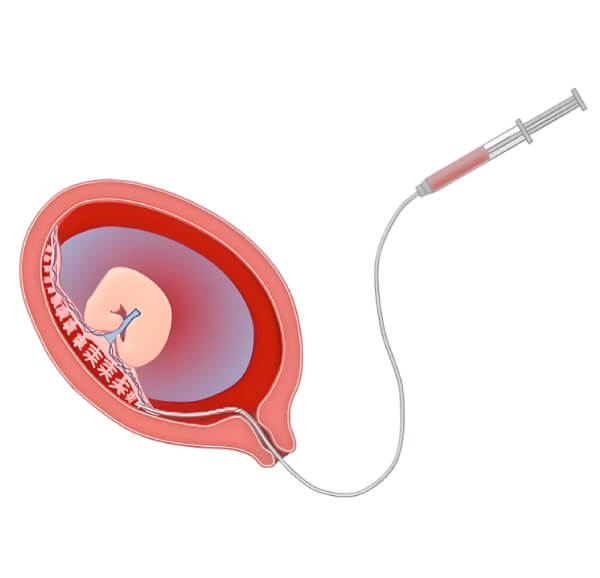
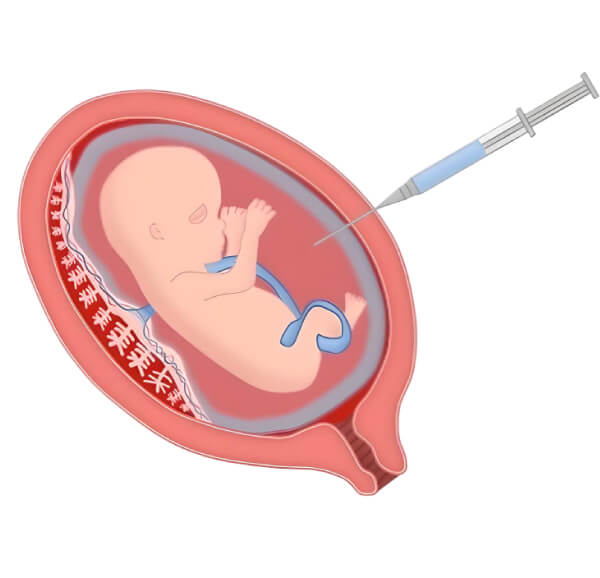
What is the Prenatal Testing for Down Syndrome?
The first step in testing for Down syndrome is usually screening tests. If your screening test results are positive, or you’re at high risk of having a baby with Down syndrome. In such a case your doctor might advise diagnostic test to confirm the diagnosis. Down syndrome can be confirmed in the baby by doing some tests, also called prenatal diagnostic tests for Down syndrome.
Generally, they involve taking a small amount of sample which includes some cells of the placental/amniotic fluid and they are sent for testing to find out if any chromosomal abnormality is present.
Prenatal Diagnostic tests that can identify Down syndrome include:
- Chorionic villus sampling (CVS): In CVS, cells are taken from the placenta and used to study the fetal chromosomes. This test is typically performed in the first trimester, between 10 and 13 weeks of pregnancy.
- Amniocentesis: A sample of the amniotic fluid surrounding the fetus is withdrawn through a needle inserted into the mother’s womb. This sample is then used to analyse the chromosomes of the fetus. Doctors usually perform this test in the second trimester, after 15 weeks of pregnancy.
Both these tests have very low risk for the baby and can be safely performed by any experienced fetal medicine consultant.
Can preimplantation genetic testing test for Down’s Syndrome ?
Preimplantation genetic testing (PGT-A) is an option for couples undergoing in vitro fertilization who are at increased risk of passing along certain genetic and chromosomal conditions especially due to advance maternal age. During PGT, the embryo is tested for genetic abnormalities before it is transferred in the womb. A biopsy sample is taken from the blastocyst and those cells are sent for analysis to find out about the risk of chromosomal abnormalities in the embryo.
When is the Down syndrome test done?
The Down syndrome testing should be offered to all pregnant women. Screening tests are advised early in the first trimester. Various tests are advised at different time in pregnancy, and your doctor will advise them based on which test they are using to screen or diagnose Down syndrome in the baby.
Following is the list of tests along with best time to advise them, used for screening and diagnosing Down syndrome:
- Non-Invasive PGT: It is used in people undergoing IVF treatment to conceive. It is a screening test to find out the risk of embryos being affected by Down syndrome; it is done before implantation in IVF conceived pregnancy. The test is done on Day 5 of embryo by sampling the fluid around the Blastocyst and testing for the embryonic DNA.
- PGT-A: This test is done during an IVF cycle before transferring the embryo. During this test cells from the Blastocyst are tested to diagnose Down syndrome in high-risk patients conceiving via IVF.
- cffDNA or NIPS: It can be advised from 10 weeks of pregnancy onwards.
- First trimester screening for Down syndrome: Offered between 11-13 weeks of pregnancy.
- Integrated Screening for Down syndrome: Offered from 11 weeks onwards until 18 weeks of pregnancy. It involves some tests done in first trimester and some in the second trimester.
How accurate is the blood test for Down syndrome?
Blood sample is taken in many screening tests for Down syndrome, here we have given the accuracy of each of them.
cffDNA has approximately 99% accuracy for detecting Down syndrome in baby.
The first trimester combined screening test has an accuracy of 85-90%.
Integrated screening test has an accuracy of around 85%.
Though blood sample is not taken for diagnostic tests but it is important to know that the diagnostic tests for Down syndrome have nearly 100% accuracy.
What are the genetic tests available for Down syndrome?
The genetic tests for Down syndrome look for abnormal genetic material which is found in an affected embryo or baby. These tests are based on collecting samples from either the embryo (in case of IVF) or the mother’s blood or directly from the placenta and amniotic fluid (fluid around the baby). These samples are then processed for detecting the abnormal DNA or chromosomes and results are analysed for finding the risk or confirmation of diagnosis. Following is a list of genetic or chromosomal tests which can be advised to detect Down syndrome.
- cffDNA/NIPS
- Ni PGT
- PGT-A
- Chorionic villous sampling (CVS)
- Amniocentesis
How long does genetic testing take for Down syndrome?
Different tests take different time frames to generate results for interpretation.
Following is a simple list of tests with their probable result timelines for your easy referral.
Please note that different clinics and laboratories might take different time to provide the results.
- Ni PGT: 1-2 weeks
- PGT-A: 7-10 days
- CffDNA/NIPS: 1 week
- Combined screening: around 2 weeks
- Integrated screening: 1 week after the last test sample taken
- Chorionic Villous Sampling (CVS): around 2 weeks
- Amniocentesis: 2-3 weeks
What is maternal serum screening for Down syndrome?
The testing of mother’s blood to detect the risk of Down syndrome in the baby is called a maternal serum test. Please read the above sections of blog to understand various maternal serum test.
It has an accuracy of around 99% for detecting if fetus has Down syndrome. It takes around a week to obtain the results of NIPS. It’s important to remember that a screening test and it estimates the likelihood of the fetus having Down syndrome. It doesn’t confirm the diagnosis and thus it should always be confirmed by a diagnostic/ confirmatory test.
What is the cost of Down’s Syndrome Test ?
As of Nov 2023, Preimplantation Genetic Tests for Down’s Syndrome in Indore typically ranges from 15k to 20k per embryo over and above the cost of IVF.
Rates for Prenatal Test for Down Syndrome in Indore are as below:
- niPT/niPS – Appx INR 20,000
- First Trimester Screening Test – Appx INR 5000
- Quadruple Marker Test – Appx INR5500
- CVS – Appx INR 25,000 to INR 30,000
- Amniocentesis – Appx INR 25,000
Is there any way to avoid pregnancy with Down syndrome if I already had a previous conception with Down syndrome?
If a couple already had a baby with Down syndrome or had a previous pregnancy where Down syndrome was detected in the baby, they are at higher risk of having another baby affected by it. Also, certain high-risk factors like mothers age more than 35 years and some chromosomal changes in either of the parent can increase the couple’s chance of having a Down syndrome affected baby. In such cases it is advised that they can opt for PGT-A after IVF treatment.
PGT-A, or Preimplantation Genetic Test for the detection of Aneuploidy, is a technique that allows the embryo to be genetically tested in the laboratory before implantation in the uterus. It allows chromosomal alterations in the embryos to be detected before embryo transfer so that only healthy chromosomally normal embryos are transferred to the uterus. This way the couple can avoid conceiving a Down syndrome affected baby all together.
In conclusion, our blog emphasizes the significance of early and comprehensive Down syndrome testing, empowering parents in Indore with knowledge for a healthier start. For more details on testing and decision-making, explore our blog on PGT-A .
